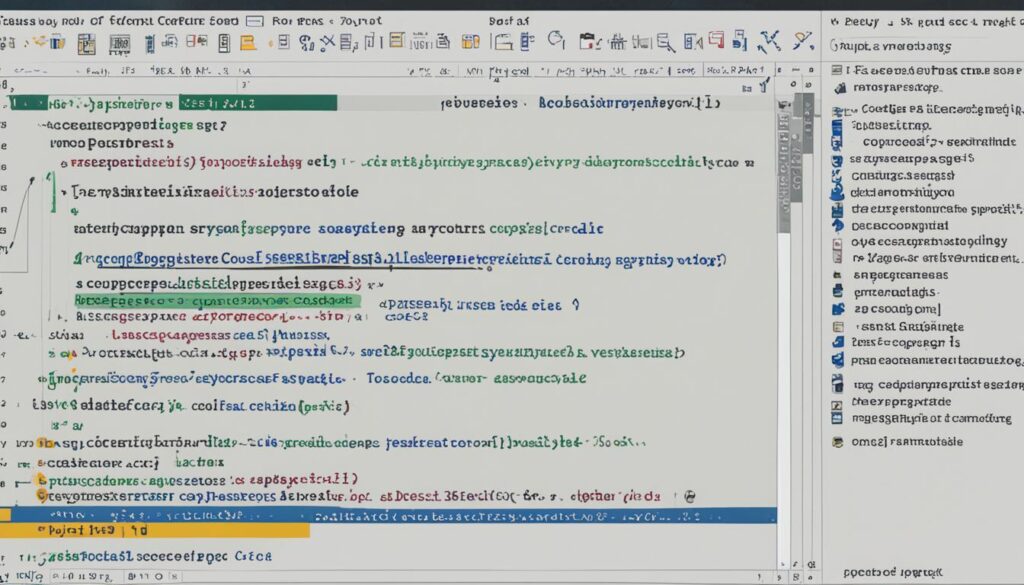Have you ever thought about how coding could be easier? A javascript online compiler makes it that simple. These tools change how we code by offering instant coding without needing to install anything locally. We’ll look at why a web-based compiler is key for making coding smoother for everyone, from newbies to experts.
Online compilers let us write, test, and improve our JavaScript code right away. This cuts down on the usual hurdles in web development. Whether we’re adding a new feature or fixing a bug, coding directly in our browser makes everything easier and faster. Let’s dive into the main advantages and features of these tools to help us pick the best for our projects.
Introduction to JavaScript Online Compilers
In today’s world, coding efficiently is more important than ever. JavaScript online compilers are key for developers. They let you write and test code right in your web browser. You don’t need to install any software, making it easy to practice and show off your JavaScript skills.
With web-based coding tools, you can try out different language features and fix bugs on the spot. You can also share your work easily. There are many online code editors for all levels, from beginners to experts who work with other programming languages.
These online compilers are loved for their easy-to-use interfaces. They suit different learning styles and coding needs. With just a few clicks, you can get to a lot of features that make coding better. They are a big help for today’s developers.
| Feature | Description | Examples |
|---|---|---|
| Real-time Execution | Immediate feedback on code changes. | JSFiddle, CodePen |
| Collaboration | Work with others in a shared environment. | Repl.it, Glitch |
| Syntax Highlighting | Enhanced readability of code. | CodeSandbox, StackBlitz |
| Debugging Tools | Built-in tools for error tracking. | JSFiddle, CodePen |
| Libraries and Frameworks Support | Incorporate popular libraries for extended functionality. | CodeSandbox, Glitch |
Benefits of Using a Web-Based JavaScript Compiler

Using a web-based JavaScript compiler has many benefits for coding projects. One big plus is the accessibility from any device with internet. This lets us work on our coding anytime and from anywhere, making coding easier for many developers.
Another big plus is getting feedback right away. Both new and experienced coders can test their code, find errors, and fix them quickly. This quick feedback helps make coding more efficient.
Built-in debugging tools make fixing problems easier too. We don’t have to switch between different apps. We can solve issues right where we write code, which saves time.
Online compilers also offer great features for working together. This is super useful for team projects and coding camps. It lets different users work together smoothly. Sharing accessible coding resources helps create a supportive learning space and encourages sharing ideas and solutions.
| Benefits | Details |
|---|---|
| Accessibility | Can be accessed from any device with internet connectivity. |
| Immediate Feedback | Fast testing and debugging of code without local setup. |
| Built-in Debugging | Integrated tools for troubleshooting within the platform. |
| Collaborative Features | Support for multiple users working together in real-time. |
Key Features of an Interactive JavaScript Platform
Interactive JavaScript platforms have many features that make coding better. They offer real-time code execution and strong debugging tools. These features help us improve our coding skills.
Real-Time Code Execution
Real-time coding is a big plus of these platforms. It lets us see how our code works right away. This makes learning faster.
When we try new coding tricks, we get instant feedback. This helps us understand programming better.
Debugging Capabilities
Debugging tools are also key. They help us find and fix errors fast. This makes building apps easier.
Modern platforms have advanced tools for checking code and finding issues. These tools turn debugging into a learning experience. This ensures our apps work well and efficiently.
How to Choose the Right Online Code Editor
Choosing the right online code editor is crucial for our programming needs. An easy-to-use interface is key to a great coding experience. It should be simple and help us move around quickly, especially if we’re new to coding.
Looking at the features of different online compilers is also important. Features like syntax highlighting and auto-completion make coding easier and reduce mistakes. Plus, having a strong community for support is a big plus. Good documentation and forums can really help when we’re stuck.
Let’s take a closer look at some top online editors:
| Editor Name | User Interface | Key Features | Community Support |
|---|---|---|---|
| CodePen | Modern and responsive | Live previews, collaboration tools | Active community, extensive tutorials |
| JSFiddle | Straightforward | Code snippets, integration with libraries | Strong community, user-contributed examples |
| Repl.it | Clean and user-friendly | Multiple language support, cloud-based | Vibrant community, helpful resources |
By looking at the design, features, and support, we can pick the best online code editors for us. This careful choice helps us find the right compiler for our coding path.
The Importance of a JavaScript IDE

In the world of JavaScript, the javaScript IDE significance is huge. IDEs offer tools that make coding easier. They help with managing code, highlighting syntax, and debugging. This setup makes us more productive, letting us write more and worry less.
IDEs are great for debugging, helping us find and fix errors fast. With tools like breakpoints, we can step through our code easily. This makes fixing problems simpler, helping both new and experienced developers.
IDEs also support version control, keeping track of our changes. This is key for working together or on big projects. Using these tools, we can improve our coding and work better with others.
Understanding what modern JavaScript IDEs offer helps us use them better. For those wanting to improve their coding skills, checking out resources like key concepts in programming is a good idea.
| IDE Feature | Benefits |
|---|---|
| Code Management | Simplifies organization and access to code files |
| Debugging Tools | Enables efficient error identification and resolution |
| Version Control Integration | Facilitates tracking and collaboration on projects |
| Syntax Highlighting | Improves readability and reduces coding errors |
Getting Started with a JavaScript Playground
Starting with JavaScript means getting to know the basics of a playground setup. This setup lets us test our code and manage projects well. We can make new projects and save our work for later, keeping things organized and efficient.
Creating a New Project
Starting a new project in a JavaScript playground is easy. Here’s what we do:
- Access the playground interface.
- Select the option to create a new project.
- Name the project in a way that shows its purpose.
- Choose the right template or start with nothing.
- Start putting our JavaScript code into the editor.
Saving Your Work
After we finish coding, saving our work is key. Good project management in JavaScript means our code is easy to get back and stays organized. Here’s how to save your project:
- Use clear filenames.
- Use version control if you can.
- Save often to prevent losing data.
- Use any export features for backups.
Following these steps helps us work better. Keeping our projects organized in the JavaScript playground makes coding fun and efficient.
Exploring Different JavaScript Development Tools

We find many tools in our journey to make JavaScript coding better. These tools help us work more efficiently and add important features for making modern apps.
Popular coding resources include React, Angular, and Vue.js. Each framework has special features for different projects. For example, React is great for building reusable components. Angular is perfect for big projects.
Online tools for JavaScript also play a big role. Sites like CodePen, JSFiddle, and Glitch let us try out code, share projects, and work together in real time. They are super useful for quick prototyping or testing without setting up local environments.
Tools like ESLint or Prettier also help keep our code clean and easy to read. They automatically find problems and suggest fixes, making sure our code follows best practices.
In summary, these resources and tools open up many possibilities for us as developers. Using powerful libraries, online tools for JavaScript, and coding resources helps us make amazing apps more efficiently.
Understanding the JavaScript Interpreter
Learning about the javascript interpreter is key for developers using online compilers. It helps us write code that runs well. We need to know the difference between compiling and interpreting JavaScript to understand its role.
Compilation vs. Interpretation
JavaScript is mainly an interpreted language. It runs code line-by-line, not all at once like compiled languages. This makes coding more dynamic and flexible.
- Compilation: This turns the whole code into machine code before it runs. It makes the code run faster but takes longer to develop.
- Interpretation: With interpretation, the code runs right away. This is great for quick development and getting fast feedback. It’s perfect for online coding where testing is done in real-time.
Knowing the differences between these methods helps us use online compilers better. It makes debugging and testing easier. Using the javascript interpreter ensures our JavaScript code works as expected.
Setting Up Your First JavaScript Test Environment

We will help you set up a great javascript test environment using an online coding space. This is key for testing and improving our coding skills.
First, pick a good online compiler that supports JavaScript. CodePen, JSFiddle, and Repl.it are top choices because they’re easy to use and have lots of features. Once you pick a platform, here’s what to do next:
- Create an account: Sign up with the online coding environment to use all its features.
- Create a new project: Make a new file for writing and running our JavaScript code.
- Write test scripts: Put in our JavaScript code and add testing frameworks like Jasmine or Mocha if needed.
- Run the code: Click the run button to see the results or any errors right away.
These steps lay a solid base for our javascript test environment setup. The online coding space gives us quick feedback, helping us improve fast. Here’s a look at three top online compilers for testing JavaScript:
| Platform | Real-Time Collaboration | Integrated Testing Frameworks | Ease of Use |
|---|---|---|---|
| CodePen | Yes | Basic (Customizable) | High |
| JSFiddle | No | Yes | Medium |
| Repl.it | Yes | Yes | High |
With this guide, setting up your first javascript test environment is easy. Enjoy coding and testing JavaScript with confidence!
How to Write Efficient Code in a JavaScript Online Compiler
Writing efficient JavaScript code is key for good performance, especially with an online compiler. We can use several strategies for efficient javascript coding. Knowing how our code works in a web setting helps us make it faster and smoother.
One good way to optimize online code is to keep functions small and simple. Each function should do just one thing, making it easier to read and fix. This method not only makes our code better but also follows best practices in javascript for better use and reuse.
Using modern JavaScript features like arrow functions and template literals helps us write cleaner code. These tools cut down on code and boost performance and readability. Asynchronous programming with promises or async/await also helps manage tasks well, leading to a better user experience.
It’s important to keep our coding consistent with clear naming and styles. Tools like ESLint can help make sure our code follows these rules. This helps a lot with efficient javascript coding by making our projects easier to keep up with.
Steering clear of issues like global variables and deep loops is crucial. These problems can slow down our code and make it hard to debug. By avoiding the global scope and using loops wisely, we can make our code better.
Finally, using performance tools in the online compiler can show us where our code is slow. This lets us keep improving our code, sticking to best practices in javascript for the best results.
| Technique | Description | Benefits |
|---|---|---|
| Small Functions | Create focused functions that handle single tasks. | Improves readability and debugging. |
| Modern Features | Use arrow functions and async programming. | Increases performance and code clarity. |
| Consistent Style | Follow naming conventions and utilize tools like ESLint. | Enhances maintainability and collaboration. |
| Avoid Pitfalls | Limit the use of global variables and deep loops. | Reduces performance issues and simplifies debugging. |
| Performance Profiling | Employ testing tools to find bottlenecks. | Facilitates continuous code optimization. |
Collaborating with Others in the Online Coding Environment
Online collaboration in coding has changed how we work on projects. A team coding environment gives us tools to boost productivity and teamwork. With real-time editing, many users can work on JavaScript together smoothly. This cuts down on misunderstandings and keeps everyone in sync.
Shared workspaces are key in these platforms. They let all team members see updates right away. This is vital for projects needing lots of feedback and changes. By working together on JavaScript, we can check changes fast, fix bugs, and grow our knowledge together.
Features like commenting and discussion channels let us share ideas and get feedback easily. These tools keep the development process clear and allow quick talks on code parts. This teamwork not only improves the final product but also builds a community among developers.
Using a team coding environment helps us work together better. Real-time editing, shared spaces, and feedback tools make a productive and learning-friendly atmosphere. By using these tools, we improve our coding projects and build stronger connections in our teams.
Best Practices for Debugging in Online Compilers
Debugging can be tough, but using good strategies helps a lot. When we debug JavaScript online, we can use tools in online compilers to make it easier.
Features like syntax highlighting help us quickly find errors. Here are some tips to make debugging smoother:
- Understand error messages well; they often give important hints for debugging.
- Use breakpoints to find tricky parts in our code, so we can check variables at key moments.
- Look at console logs to see how our script runs in complex situations.
- Check the output of our code often to spot mistakes early.
- Test small parts of code alone to find issues before adding them to big projects.
Online compilers make debugging better by giving us feedback in real-time. We see our results right after making changes. By using these tips, we can debug more efficiently and write stronger code.
| Debugging Technique | Benefit |
|---|---|
| Syntax Highlighting | Quickly spots errors tied to syntax problems. |
| Breakpoints | Allows us to look at variables and control flow at certain lines. |
| Console Logging | Tracks how the script runs and finds unexpected actions. |
| Output Review | Finds errors in outputs early on. |
| Isolated Testing | Helps pinpoint issues without affecting the whole project. |
Advanced Features of Modern JavaScript Online Compilers
Modern online compilers offer many advanced features that make coding better and faster. They have tools that help us work smarter and improve our skills.
Code sharing is a key feature that lets us share our work with others easily. This helps us work together better and get feedback faster. It makes fixing bugs and improving our code quicker.
Working with version control systems is another big plus. It lets us keep track of changes and go back to previous versions if needed. This way, we can work on projects safely, without worrying about losing our work.
Advanced debugging tools are also available, making it easier to find and fix problems. Tools like breakpoints and variable inspection are great for improving our coding skills. They help us make sure our code is top-notch.
| Feature | Benefits |
|---|---|
| Code Sharing | Encourages collaboration and provides quick feedback. |
| Version Control Integration | Allows tracking of changes and easy collaboration. |
| Advanced Debugging Tools | Helps identify and fix issues more efficiently. |
These advanced features make modern online compilers a must-have for all developers. By using these tools, we can make our projects better and achieve great results.
Integrating External Libraries in a JavaScript Playground
Adding external libraries to JavaScript can make our coding better and our apps more functional. By looking at popular libraries, we see how they make coding easier and increase our productivity. We’ll talk about some top libraries and what to think about when using them.
Using Popular Libraries
Some top JavaScript libraries include:
- jQuery: Makes working with HTML documents, handling events, and animations easier.
- React: A library for building interfaces, known for its modular design.
- Lodash: Offers tools for working with arrays and objects.
- Chart.js: A simple library for creating charts for designers and developers.
Using these libraries saves time and makes our apps better without needing to write a lot of code.
Performance Considerations
When thinking about performance, we need to see how libraries will affect our app. Here are important things to remember:
| Library | Performance Impact | Best Use Cases |
|---|---|---|
| jQuery | Can add overhead if only using limited features | DOM manipulation and event handling |
| React | Optimized with virtual DOM for high performance | Complex UIs with dynamic data |
| Lodash | Efficient for large data sets | Data processing and manipulation |
| Chart.js | Lightweight, but can slow down with many charts | Data visualization |
Thinking about these points helps us keep our apps fast while using libraries. With the right choice and integration, we can make efficient and strong applications.
Limitations of JavaScript Online Compilers
Using JavaScript online compilers has its downsides that can affect our coding. These platforms are handy but come with challenges that might slow us down. They can make our work less efficient.
One big issue is needing a steady internet connection. Without it, we can’t use these tools well, which messes up our work flow. This is a big problem when we’re up against the clock.
Performance is another problem. Online compilers often don’t have enough power, making big scripts run slow. This is bad news for those who need quick results, like when testing big projects or complex algorithms.
Also, the drawbacks of online tools include not having all the features we need. Some settings that developers count on might not work. This can be a big hurdle for those working on big projects.
Here’s a table that lists the main issues with using JavaScript online compilers:
| Limitation | Description |
|---|---|
| Dependency on Internet | Reliance on a stable internet connection for access to the compiler. |
| Performance Constraints | Slower execution times due to limited resources. |
| Limited Configuration Options | Inability to adjust environmental settings for complex projects. |
Conclusion
Our look into JavaScript online compilers has shown their many benefits. These platforms make coding easier and more fun. They let us write and test code right away and work together with others.
Using online compilers is more than just easy access. It’s a big step to better coding skills. They are perfect for trying new things and getting better at web development. We suggest using these tools every day to keep improving and getting better at coding.
In today’s fast-paced world, learning quickly and being able to adapt is key. The final thoughts on JavaScript online compilers show they are a must-have for us. By using these great tools, we set ourselves up for success in coding.



Leave a Reply